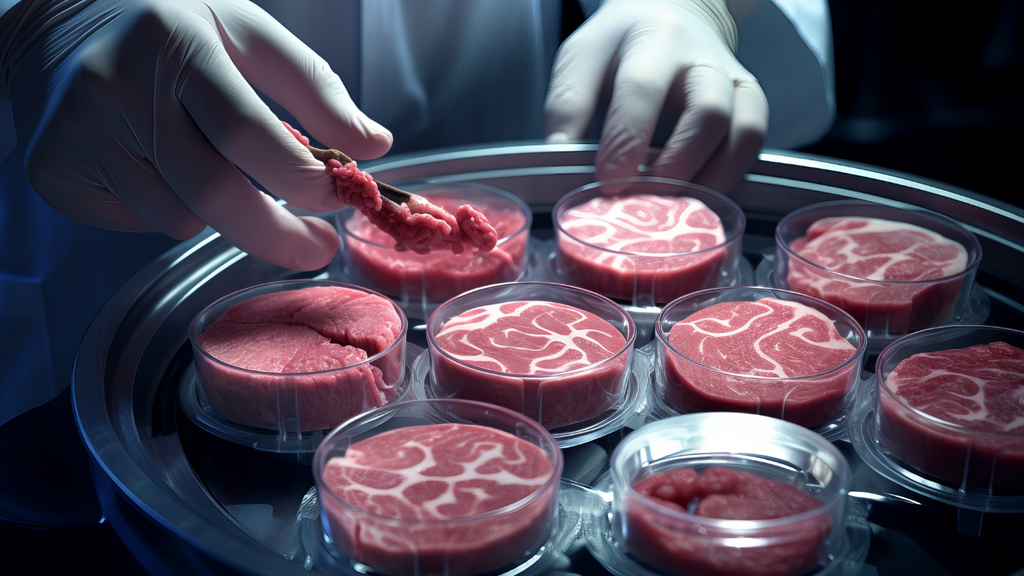ITALY BANS LAB GROWN MEAT.
Italy officially becomes the first nation to outright ban lab grown meat in an effort to protect its farmers and the health of its citizens. Now we need the world to follow.
Lab grown meat is unfit for human consumption. It is detrimental to our health and to the wider environment.
The process of creating lab grown meat is incredibly resource-intensive and the cells included are genetically modified and prone to mutation, which makes them carcinogenic.
Furthermore, one study found that lab grown meat is up to 25 times more costly for the environment than beef, with processing techniques having a huge negative impact on the planet and ecosystems.
No matter how they paint it to you, lab grown meat will always just be another unhealthy ultra processed product.
There is nothing sustainable or healthy about it. Eat real meat and support regenerative farmers.
1. Italy Takes a Stand

Italy has become the first nation to outright ban lab-grown meat. This move isn’t just symbolic—it’s a direct stand against corporations like those backed by Bill Gates who push synthetic foods as the “future.” Italians recognize that food is culture, health, and heritage, not something to be faked in a stainless-steel lab. If one of the world’s most famous culinary nations refuses to touch lab-grown meat, shouldn’t that tell us something?
2. Carcinogenic Risks in a Petri Dish

The very process of creating lab-grown meat raises red flags. Cells are genetically modified, kept alive with growth serums, and prone to mutation. That means the end product carries risks of carcinogenic properties. Real meat from a pasture-raised cow contains the natural checks and balances of biology. Lab meat? It’s a science experiment with your dinner plate as the test subject.
3. Humanity Already Tried This—Naturally

The irony is, humans already figured out how to grow meat: raise an animal, let it graze, and harvest it. This natural system worked for millennia. Lab-grown advocates claim they’re “replicating nature,” but what they’re really doing is stripping away complexity, nutrients, and balance. The arrogance of thinking we can outsmart evolution with a petri dish is astounding.
4. Nutrient Void Franken-Food

Lab-grown meat is marketed as “real” meat, but it lacks the full nutrient profile of actual animal flesh. Meat isn’t just protein—it’s heme iron, B vitamins, creatine, taurine, and dozens of compounds we haven’t even discovered yet. Lab-grown versions can’t replicate this complexity. Eating it is like trading a grass-fed steak for a Soylent shake—soulless, nutrient void, and disconnected from what makes food powerful.
5. Environmental Concerns Nobody Talks About

The narrative is that lab-grown meat will “save the planet.” But when you peel back the marketing, the story falls apart. Growing cells in sterile environments requires massive amounts of energy, single-use plastics, and chemicals. The waste alone is staggering. Instead of connecting us back to the land, lab-grown meat pulls us further into dependency on industrial systems.
6. Twenty-Five Times Worse for the Planet

A recent analysis found that lab-grown meat is up to 25 times more costly for the environment than beef. Yes, you read that right. The energy and resources required to manufacture it dwarf the inputs needed to raise cattle—especially regenerative cattle that build soil and sequester carbon. Far from being a “climate solution,” lab meat could end up as one of the biggest ecological disasters of our time.
7. Nothing Beats the Real Thing

No lab-grown product will ever compare to the taste, texture, or nutrient density of real steak. Or a Carnivore Bar for that matter. When you bite into grass-fed beef, you’re not just eating—you’re connecting to an ancient human tradition. Compare that to a processed science project in shrink-wrap. Which one would you rather fuel your body with?
Closing Thoughts
Italy’s ban on lab-grown meat isn’t a step backward—it’s a step toward protecting real food, real farmers, and real health. As corporations scramble to sell us more fake food in the name of “progress,” it’s up to us to say no. The answer to our health and environmental challenges has never been in a lab. It has always been in nature, on the farm, and on the plate. Eat real meat. Support regenerative farmers. Reject the lab.
References
- “Italy Bans Lab-Grown Meat.” BBC News, 30 Nov. 2023.
- Ong, Kai Wen David, et al. “Cellular Agriculture: The Carcinogenic Risks of Cultured Meat.” Food and Chemical Toxicology, vol. 168, 2022, p. 113401.
- Stephens, Neil, et al. “Bringing Cultured Meat to Market: Technical, Socio-Political, and Regulatory Challenges in Cellular Agriculture.” Trends in Food Science & Technology, vol. 78, 2018, pp. 155–166.
- Bhat, Zuhaib F., et al. “Prospects for Cultured Meat—Advancing Meat Alternatives.” Journal of Integrative Agriculture, vol. 14, no. 2, 2015, pp. 227–233.
- Lynch, John, and Hanna Tuomisto. “Environmental Impacts of Cultured Meat Production.” Environmental Science & Technology, vol. 56, no. 9, 2022, pp. 5621–5628.
- Mattick, Christopher S., et al. “Anticipatory Life Cycle Analysis of In Vitro Biomass Cultivation for Cultured Meat Production in the United States.” Environmental Science & Technology, vol. 49, no. 19, 2015, pp. 11941–11949.
- Leroy, Frédéric, and Martin Cohen. “The Curious Case of Cultured Meat: Promises and Reality.” Meat Science, vol. 174, 2021, p. 108423.

